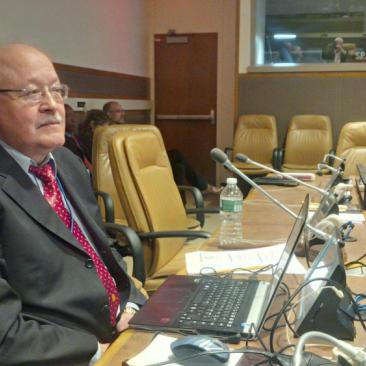Indigenous Peoples around the world face many hardships, from government repression to torture and genocide. Some of these abuses are happening in countries ‘important’ to FSC. FSC Board of Directors Liaison Larry Joseph and FSC Permanent Indigenous Peoples’ Committee (PIPC) member Anders Blom attended the United Nations Permanent Forum on Indigenous Issues (UNPFII) 14th session (New York, 20 April to 1 May 2015) to seek answers to some “simple but crucial questions” questions.
Aboriginal Canadian Larry Joseph, whose heritage stems from the Wet’suwet’en and Dakelh (Carrier) people of northwestern Canada, presents the Social North Sub-chamber on the FSC Board of Directors. He has a keen interest in indigenous issues, having represented Canada’s aboriginal peoples at the Kyoto climate change talks in 1997. He subsequently took part in several international events of the Subsidiary Body for Implementation and the Subsidiary Body for Scientific and Technological Advance of the UN Framework Convention on Climate Change. He went to UNPFII to find out:
- How do UN agencies, programs and funds protect Indigenous Peoples?
- How could UN agencies and the UNPFII help FSC and PIPC with up-to-date information about the state of indigenous rights around the world, its protection of indigenous rights, interests and the through its best practices in the implementation of the principle of free, prior and informed consent?
- What is the current status of indigenous rights around the world, especially in countries and territories ‘important’ to FSC?
- What lessons from UNPFII could help the FSC Board, FSC and PIPC?
Joseph and Blom presented the FSC and PIPC approach to indigenous governance to delegates at a side event. The message was, according to Joseph, “positively and respectfully” received, although the audience was small. In particular, the concept of free, prior and informed consent drew attention from the Asian Development Bank, International Union for Conservation of Nature (IUCN), the UN and USAID, who recognized FSC as a global leader in encouraging this.
Some 85 side events provided opportunities for Indigenous People’s organizations, member states, UN entities, intergovernmental organizations and NGOs to present their findings and perspectives. Meanwhile, the formal sessions featured statements about indigenous issues from indigenous organizations and representatives of countries with big indigenous populations. The messages were consistent: Indigenous Peoples still face government repression, racism, poverty, exploitation, torture, genocide, ethnic cleansing and more.
For example, the Maasai in Tanzania have suffered ethnic cleansing for decades. Recently, Maasai communities have been attacked at Mabwegere. The attacks had started shortly after the burial of a Morogoro farmer on January 28’15. A politician called for the attacks at the funeral of the farmer.
Adam Ole Mwarabu (PIPC member for East Africa), a Maasai, sought to raise international awareness about the plight of his people at UNPFII 14. His initiative was not done through FSC or PIPC. Instead, an agency of the European Union provided financial assistance for his participation in the world event.
What is more, Larry Joseph assisted him and was at his side and his witness when Mwarabu met Victoria Tauli Corpuz, the UN Special Rapporteur for Indigenous Rights, about the difficulties faced by the Maasai. Subsequently, Mwarabu agreed to provide Tauli Corpez with a written general update of the situation in Tanzania, and then begin to engage multiple UN agencies on this issue.
Indigenous Peoples in forest areas may be displaced by big forestry business or have their access to traditional forests denied or blocked. The new reporting procedure means that there is now a mechanism to report such bullying (along with other human rights violations) to a global authority. The FSC, UNDP and World Bank standards – especially free, prior and informed consent – are mechanisms to safeguard the rights of Indigenous Peoples and other traditional land users to access and use forests and other natural resources.

- The Indigenous Peoples’ Center for Documentation, Research and Information and the UN Voluntary Fund for Indigenous Peoples have established a reporting procedure for human rights violations against Indigenous Peoples, and UN thematic experts will follow up on reported cases. The United Nations Development Programme (UNDP) has made free, prior and informed consent, and adherence to its own social and environmental standards, prerequisites for its support. Meanwhile, the World Bank is working on standards for Indigenous Peoples’ development.
- Indigenous rights are under serious threat in Australia and Brazil in particular – both countries are important to FSC.
- FSC and PIPC need to track the future work of UNPFII, in particular engaging in the Post-2015 Development Agenda, and play an active, high-profile role in the 2016 session of UNPFII.

